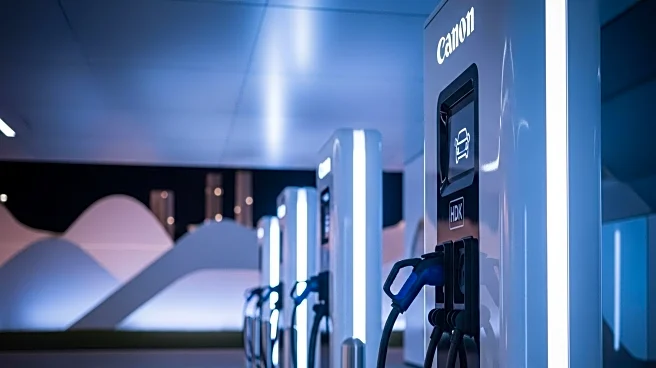What is the story about?
What's Happening?
Hyundai Motor Group has announced a $2.7 billion investment to expand its electric vehicle plant in Ellabell, Georgia. This decision comes despite recent immigration raids that led to the arrest of over 300 South Korean citizens, raising diplomatic tensions between South Korea and the United States. The expansion aims to increase production capacity to 500,000 vehicles annually over the next three years. Hyundai plans to produce 10 models of electric and hybrid vehicles at the site, up from the current two models. The company is committed to making 80% of vehicles sold in the U.S. domestically by 2030, including a mid-sized pickup truck. The expansion is part of Hyundai's broader strategy to increase global production to 5.6 million vehicles annually by 2030, with 60% being electric or hybrid-powered.
Why It's Important?
The expansion of Hyundai's Georgia plant is significant for the U.S. automotive industry, particularly in the electric vehicle sector. It underscores the growing importance of domestic production in meeting the increasing demand for electric vehicles. The investment is expected to create thousands of jobs, contributing to local economic growth. However, the immigration raid has highlighted potential challenges in international business relations and workforce management. The diplomatic dispute may affect future foreign investments and the ability of South Korean employees to work in the U.S. The situation also emphasizes the need for clear immigration policies to support international business operations.
What's Next?
Hyundai plans to open the delayed battery plant in the first half of 2026, following the immigration raid. Georgia officials, including Governor Brian Kemp, are working to reassure foreign investors about the state's business environment. Discussions with the White House regarding visa issues for South Korean employees are ongoing. Hyundai remains committed to its long-term strategic plan in the U.S., with plans to hire at least 8,500 workers by 2031. The company is also focusing on expanding its investment in robotics and launching extended-range electric vehicles by 2027.
Beyond the Headlines
The diplomatic tensions resulting from the immigration raid could lead to changes in U.S. immigration policies, particularly concerning foreign workers in the automotive industry. This situation may prompt discussions on balancing national security concerns with economic growth and international business relations. Additionally, Hyundai's commitment to increasing domestic production reflects broader trends in the automotive industry towards localization and sustainability.















